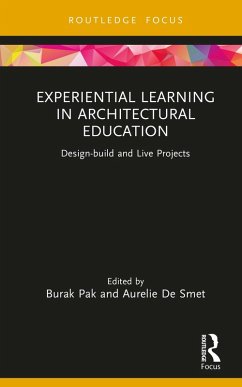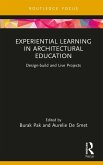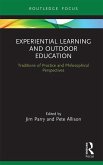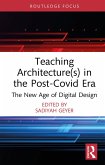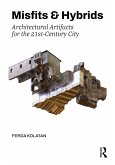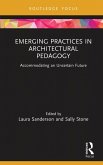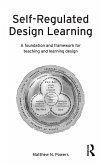Experiential Learning in Architectural Education (eBook, ePUB)
Design-build and Live Projects
Redaktion: Pak, Burak; de Smet, Aurelie
20,95 €
20,95 €
inkl. MwSt.
Sofort per Download lieferbar

10 °P sammeln
20,95 €
Als Download kaufen

20,95 €
inkl. MwSt.
Sofort per Download lieferbar

10 °P sammeln
Jetzt verschenken
Alle Infos zum eBook verschenken
20,95 €
inkl. MwSt.
Sofort per Download lieferbar
Alle Infos zum eBook verschenken

10 °P sammeln
Experiential Learning in Architectural Education (eBook, ePUB)
Design-build and Live Projects
Redaktion: Pak, Burak; de Smet, Aurelie
- Format: ePub
- Merkliste
- Auf die Merkliste
- Bewerten Bewerten
- Teilen
- Produkt teilen
- Produkterinnerung
- Produkterinnerung

Bitte loggen Sie sich zunächst in Ihr Kundenkonto ein oder registrieren Sie sich bei
bücher.de, um das eBook-Abo tolino select nutzen zu können.
Hier können Sie sich einloggen
Hier können Sie sich einloggen
Sie sind bereits eingeloggt. Klicken Sie auf 2. tolino select Abo, um fortzufahren.

Bitte loggen Sie sich zunächst in Ihr Kundenkonto ein oder registrieren Sie sich bei bücher.de, um das eBook-Abo tolino select nutzen zu können.
This book is designed to be of interest to many different audiences due to its cross-sectoral and transdisciplinary content. It will appeal to those within architectural higher education as well as to spatial practitioners, students, civic and governmental organizations engaged in socio-spatial projects.
- Geräte: eReader
- ohne Kopierschutz
- eBook Hilfe
- Größe: 5.1MB
Andere Kunden interessierten sich auch für
![Experiential Learning in Architectural Education (eBook, PDF) Experiential Learning in Architectural Education (eBook, PDF)]() Experiential Learning in Architectural Education (eBook, PDF)20,95 €
Experiential Learning in Architectural Education (eBook, PDF)20,95 €![Experiential Learning and Outdoor Education (eBook, ePUB) Experiential Learning and Outdoor Education (eBook, ePUB)]() Experiential Learning and Outdoor Education (eBook, ePUB)20,95 €
Experiential Learning and Outdoor Education (eBook, ePUB)20,95 €![Teaching Architecture(s) in the Post-Covid Era (eBook, ePUB) Teaching Architecture(s) in the Post-Covid Era (eBook, ePUB)]() Teaching Architecture(s) in the Post-Covid Era (eBook, ePUB)16,95 €
Teaching Architecture(s) in the Post-Covid Era (eBook, ePUB)16,95 €![Teaching Climate Change in the United States (eBook, ePUB) Teaching Climate Change in the United States (eBook, ePUB)]() Teaching Climate Change in the United States (eBook, ePUB)38,95 €
Teaching Climate Change in the United States (eBook, ePUB)38,95 €![Misfits & Hybrids: Architectural Artifacts for the 21st-Century City (eBook, ePUB) Misfits & Hybrids: Architectural Artifacts for the 21st-Century City (eBook, ePUB)]() Ferda KolatanMisfits & Hybrids: Architectural Artifacts for the 21st-Century City (eBook, ePUB)27,95 €
Ferda KolatanMisfits & Hybrids: Architectural Artifacts for the 21st-Century City (eBook, ePUB)27,95 €![Emerging Practices in Architectural Pedagogy (eBook, ePUB) Emerging Practices in Architectural Pedagogy (eBook, ePUB)]() Emerging Practices in Architectural Pedagogy (eBook, ePUB)14,95 €
Emerging Practices in Architectural Pedagogy (eBook, ePUB)14,95 €![Self-Regulated Design Learning (eBook, ePUB) Self-Regulated Design Learning (eBook, ePUB)]() Matthew PowersSelf-Regulated Design Learning (eBook, ePUB)53,95 €
Matthew PowersSelf-Regulated Design Learning (eBook, ePUB)53,95 €-
-
-
This book is designed to be of interest to many different audiences due to its cross-sectoral and transdisciplinary content. It will appeal to those within architectural higher education as well as to spatial practitioners, students, civic and governmental organizations engaged in socio-spatial projects.
Dieser Download kann aus rechtlichen Gründen nur mit Rechnungsadresse in A, B, BG, CY, CZ, D, DK, EW, E, FIN, F, GR, HR, H, IRL, I, LT, L, LR, M, NL, PL, P, R, S, SLO, SK ausgeliefert werden.
Produktdetails
- Produktdetails
- Verlag: Taylor & Francis
- Seitenzahl: 142
- Erscheinungstermin: 15. August 2022
- Englisch
- ISBN-13: 9781000775754
- Artikelnr.: 64994055
- Verlag: Taylor & Francis
- Seitenzahl: 142
- Erscheinungstermin: 15. August 2022
- Englisch
- ISBN-13: 9781000775754
- Artikelnr.: 64994055
Burak Pak is Professor of Architectural Collaborative Design, Collective Spaces and Digital Media at KU Leuven Faculty of Architecture. He holds a PhD from ITU Faculty of Architecture. After working at Carnegie Mellon University School of Architecture and Texas A&M University VIZLab as Visiting Scholar, he worked as post-doctoral research fellow at KU Leuven Faculty of Architecture on 'Alternative Urban Projects for the Brussels Capital Region'. He is co-founder of the Altering Practices (Alt_Shift) Research Group. Burak is currently teaching design studio courses and running several international and national research projects. Burak's research covers an interdisciplinary area between architecture and urban design, participation and digital spatial media. The two main and complementary focus points are exploring and enabling bottom-up participation {in} and {through} reflexive research and design practices. His research focuses on enabling inclusion in and through design. Co-creation and co-design play a central role in the research projects he participates in through which he aims to integrate social design practices, education and research. Examples of the research projects he is involved in are: 'Networked Practices for Placemaking' (EC Co-create), 'Solidary Mobile Housing' (INNOVIRIS Co-create) and 'Incubators of Public Spaces' (JPI-Urban Europe). Aurelie De Smet graduated in Architecture at the Hogeschool voor W&K, Sint-Lucas Gent and in Spatial Planning at the University of Ghent. After working as independent architect for several years, she was offered a grant by the Brussels-Capital Region (Innoviris) for a three-year research project on 'The Role of Temporary Use of Waiting Spaces'. This research (promoted by Prof. Kees Doevendans and Prof. Bruno De Meulder) led to a series of publications, workshops and consultancy assignments on 'temporary use', 'bottom-up urbanism' and 'tactical urban planning'. From 2014 until 2020 Aurelie worked at the Landscape Architecture Department of the Erasmus University College, where she co-founded the Centre of Expertise Tuin+. In this context, she gained considerable experience in involving landscape architecture students in practice-oriented research on 'the gardenscape'. Currently, she is working as a researcher on the 'Solidary Mobile Housing' project at the KU Leuven Faculty of Architecture and combining this with a PhD on 'Increasing Socio-spatial Resilience through Solidary Appropriation of Urban Waiting Spaces for Housing in Brussels' (promoted by Prof. Burak Pak and Prof. Yves Schoonjans). She is also a member of the Altering Practices for Urban Inclusion Research Group and is co-teaching Community-engaged Architectural Design Learning studio and elective courses at the faculty.
List of figures
List of contributors
Introduction
- BURAK PAK AND AURELIE DE SMET
1 When Design-Build Met the Live Project - or - What Is a Live-Build
Project Anyway?
- JAMES BENEDICT BROWN AND PETER RUSSELL
2 Inspiring Public Imagination through a Micro Ecovillage for Students
- CAMERON VAN DYKE
3 Moving from Learning to Doing: An Educational Experience of Temporary
Tactical Action
- SILVIA TEDESCO, ELENA MONTACCHINI, TOMMASO FERRARIS AND CARLOTTA GERBINO
4 Training Future Architects through Professional Responsibility: Working
with Real Cases in the Master's Degree in Architecture at Vallès School of
Architecture
- MARTA SERRA-PERMANYER AND ROGER-JOAN SAUQUET LLONCH
5 Community-Engaged Architectural Design Learning as Critical Spatial
Practice: The Case of the Solidary Mobile Housing Project
- AURELIE DE SMET, BURAK PAK, YVES SCHOONJANS, SARA VANTOURNHOUT, GERALDINE
BRUYNEEL, TINEKE VAN HEESVELDE, AND KEN DE COOMAN
6 Co-Creating Urban Strategies through Trans-Local Learning Alliances
- CATALINA ORTIZ
Index
List of contributors
Introduction
- BURAK PAK AND AURELIE DE SMET
1 When Design-Build Met the Live Project - or - What Is a Live-Build
Project Anyway?
- JAMES BENEDICT BROWN AND PETER RUSSELL
2 Inspiring Public Imagination through a Micro Ecovillage for Students
- CAMERON VAN DYKE
3 Moving from Learning to Doing: An Educational Experience of Temporary
Tactical Action
- SILVIA TEDESCO, ELENA MONTACCHINI, TOMMASO FERRARIS AND CARLOTTA GERBINO
4 Training Future Architects through Professional Responsibility: Working
with Real Cases in the Master's Degree in Architecture at Vallès School of
Architecture
- MARTA SERRA-PERMANYER AND ROGER-JOAN SAUQUET LLONCH
5 Community-Engaged Architectural Design Learning as Critical Spatial
Practice: The Case of the Solidary Mobile Housing Project
- AURELIE DE SMET, BURAK PAK, YVES SCHOONJANS, SARA VANTOURNHOUT, GERALDINE
BRUYNEEL, TINEKE VAN HEESVELDE, AND KEN DE COOMAN
6 Co-Creating Urban Strategies through Trans-Local Learning Alliances
- CATALINA ORTIZ
Index
List of figures
List of contributors
Introduction
- BURAK PAK AND AURELIE DE SMET
1 When Design-Build Met the Live Project - or - What Is a Live-Build
Project Anyway?
- JAMES BENEDICT BROWN AND PETER RUSSELL
2 Inspiring Public Imagination through a Micro Ecovillage for Students
- CAMERON VAN DYKE
3 Moving from Learning to Doing: An Educational Experience of Temporary
Tactical Action
- SILVIA TEDESCO, ELENA MONTACCHINI, TOMMASO FERRARIS AND CARLOTTA GERBINO
4 Training Future Architects through Professional Responsibility: Working
with Real Cases in the Master's Degree in Architecture at Vallès School of
Architecture
- MARTA SERRA-PERMANYER AND ROGER-JOAN SAUQUET LLONCH
5 Community-Engaged Architectural Design Learning as Critical Spatial
Practice: The Case of the Solidary Mobile Housing Project
- AURELIE DE SMET, BURAK PAK, YVES SCHOONJANS, SARA VANTOURNHOUT, GERALDINE
BRUYNEEL, TINEKE VAN HEESVELDE, AND KEN DE COOMAN
6 Co-Creating Urban Strategies through Trans-Local Learning Alliances
- CATALINA ORTIZ
Index
List of contributors
Introduction
- BURAK PAK AND AURELIE DE SMET
1 When Design-Build Met the Live Project - or - What Is a Live-Build
Project Anyway?
- JAMES BENEDICT BROWN AND PETER RUSSELL
2 Inspiring Public Imagination through a Micro Ecovillage for Students
- CAMERON VAN DYKE
3 Moving from Learning to Doing: An Educational Experience of Temporary
Tactical Action
- SILVIA TEDESCO, ELENA MONTACCHINI, TOMMASO FERRARIS AND CARLOTTA GERBINO
4 Training Future Architects through Professional Responsibility: Working
with Real Cases in the Master's Degree in Architecture at Vallès School of
Architecture
- MARTA SERRA-PERMANYER AND ROGER-JOAN SAUQUET LLONCH
5 Community-Engaged Architectural Design Learning as Critical Spatial
Practice: The Case of the Solidary Mobile Housing Project
- AURELIE DE SMET, BURAK PAK, YVES SCHOONJANS, SARA VANTOURNHOUT, GERALDINE
BRUYNEEL, TINEKE VAN HEESVELDE, AND KEN DE COOMAN
6 Co-Creating Urban Strategies through Trans-Local Learning Alliances
- CATALINA ORTIZ
Index
